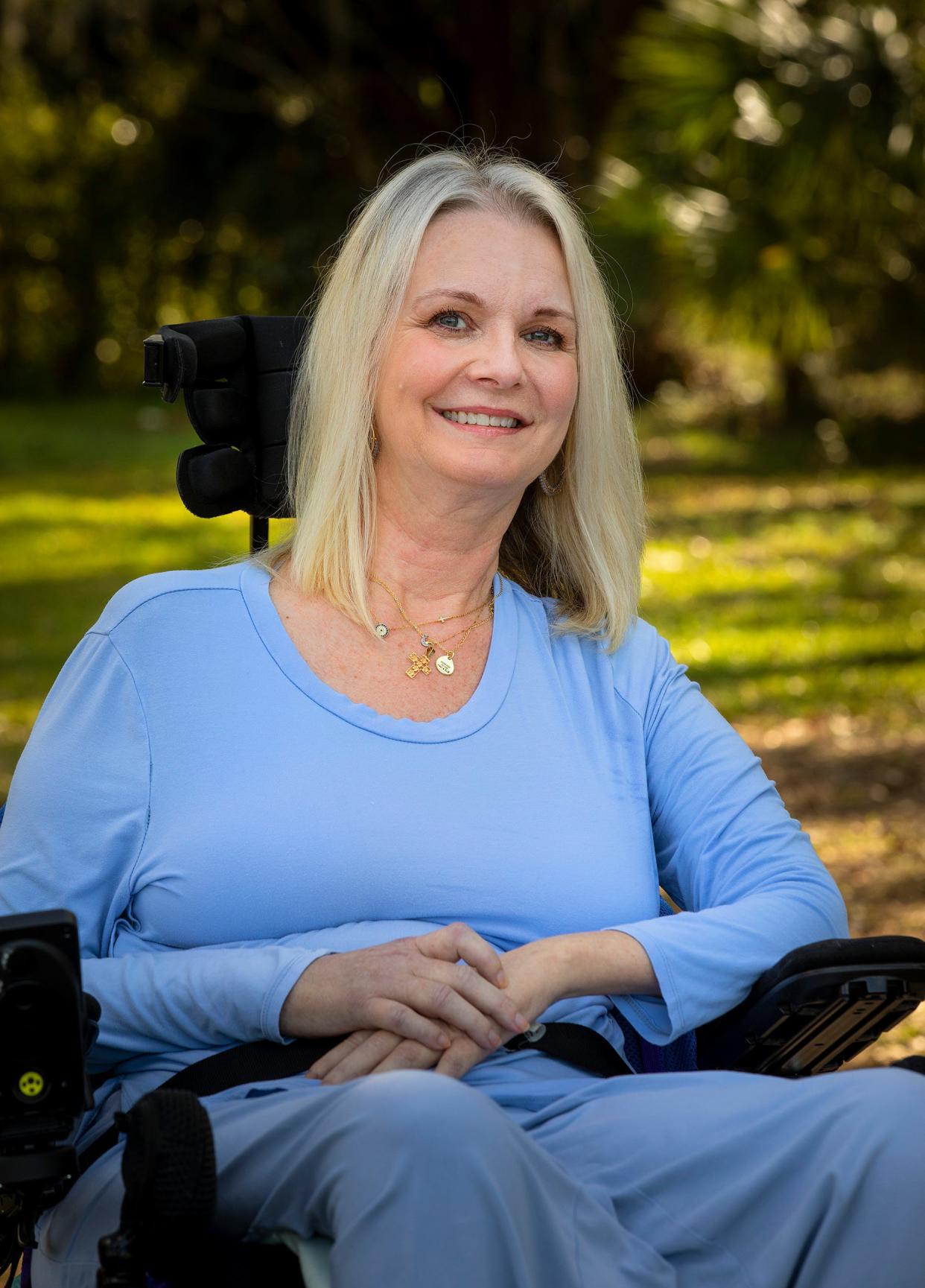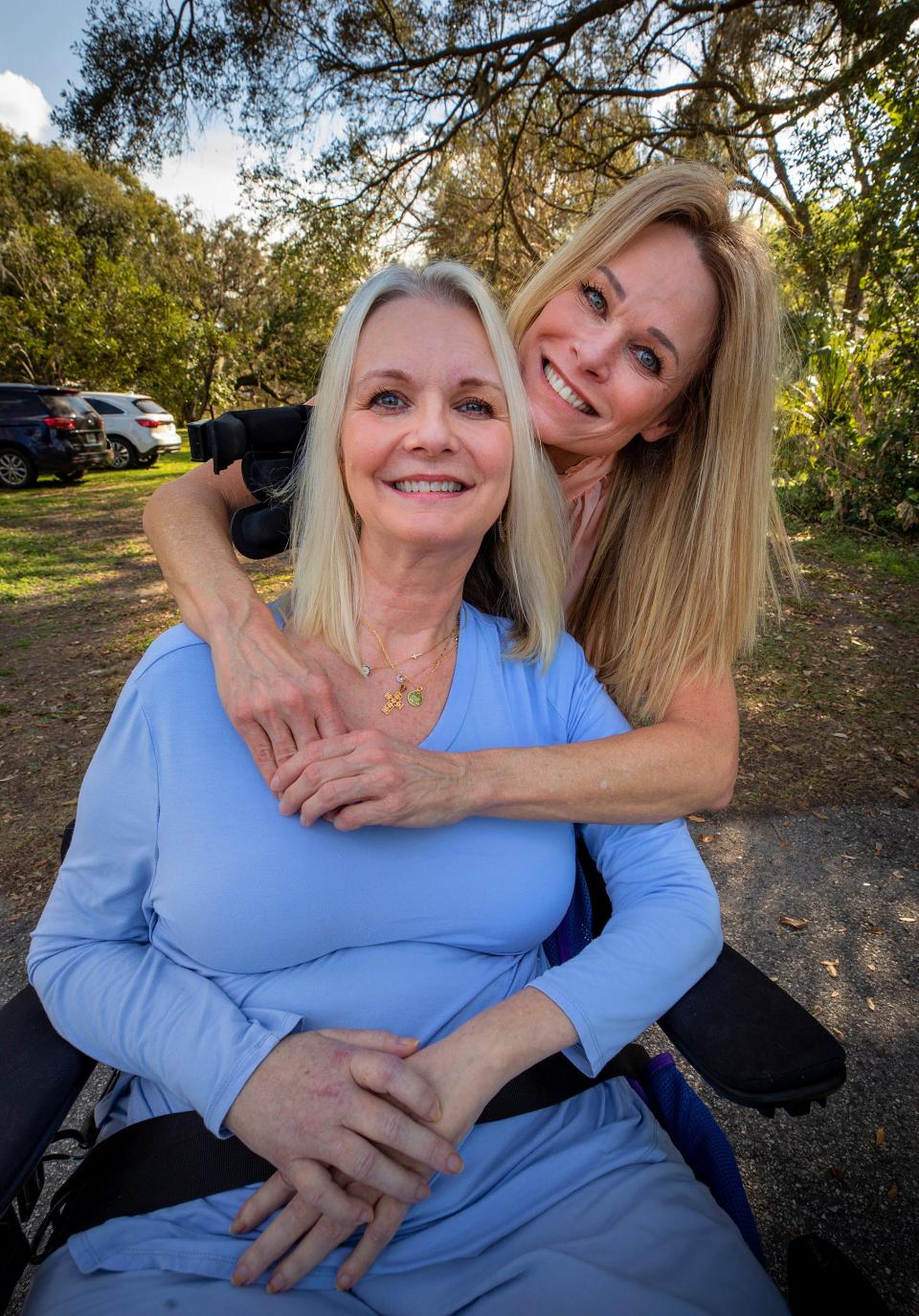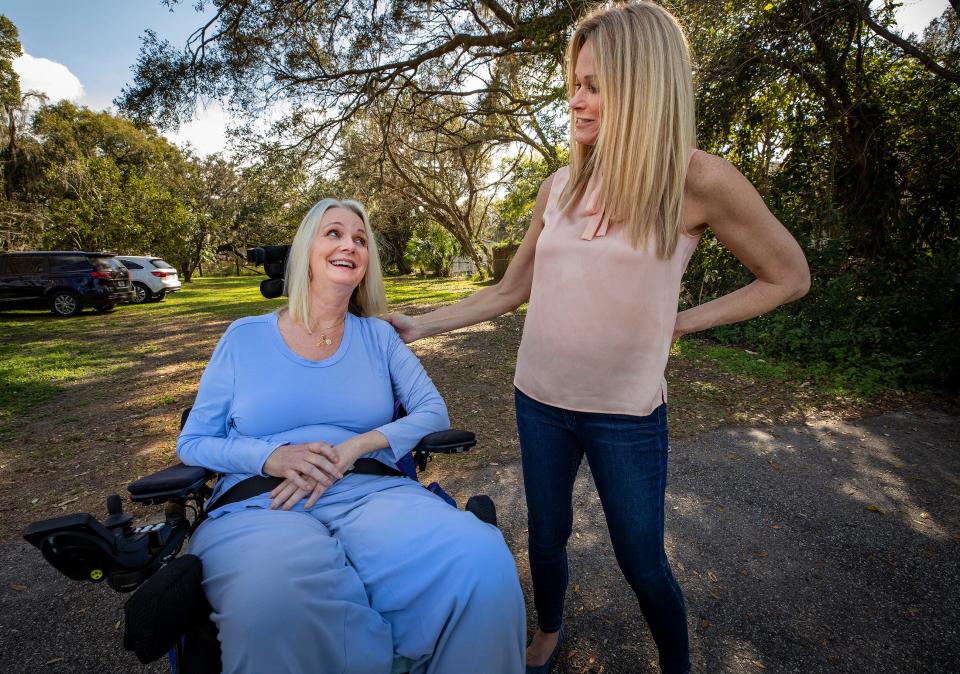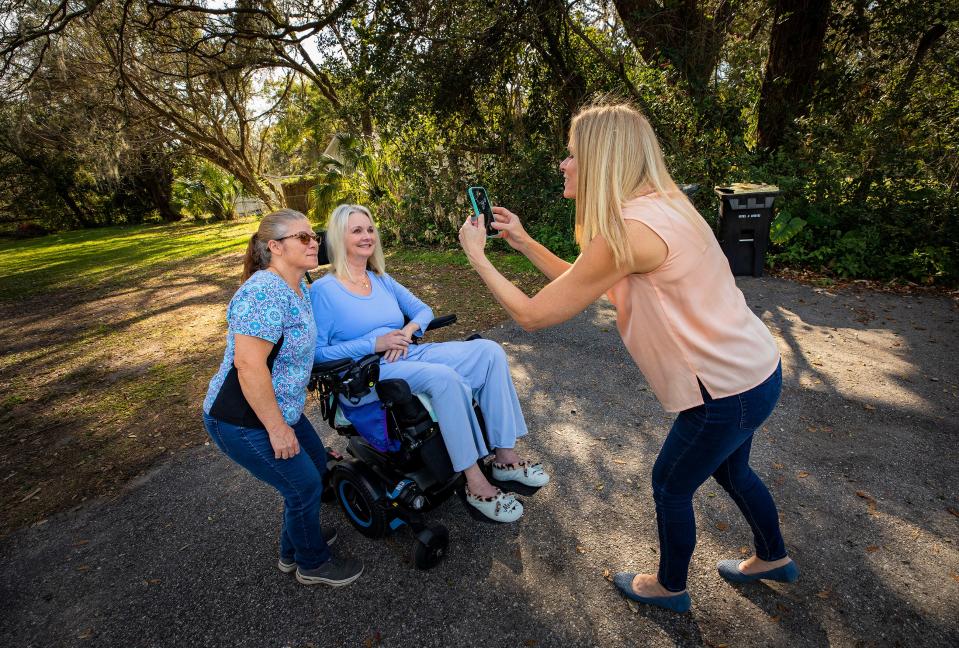'Still doesn't seem real': Lakeland woman chooses optimism despite cruel progression of ALS

LAKELAND — Laura Pinner frequently utters the phrase “both/and.”
Pinner, diagnosed less than two years ago with one of the cruelest of diseases, has ample opportunity to embrace despair. Amyotrophic lateral sclerosis has robbed her of virtually all physical control except for minimal use of her right hand.
'It's like a big hug': Community, friends help Lakeland woman find gratitude amid ALS losses
'She saw herself as a servant': Bartow woman whose ALS fight inspired others dies at 64
No longer able to move herself out of bed, Pinner relies on caregivers to maneuver her into her power wheelchair by operating a mechanical lifting device.
“I’m like a cow going through the air,” Pinner said on a recent afternoon.
She has retained her self-deprecating humor despite all the hardships and losses the disease has forced upon her.
“Laughter is the best medicine,” she said. “We laugh a lot here. We cry a lot, too. Again — both/and.”
For Pinner, 53, “both/and” means finding reasons to smile and laugh when there are so many reasons to cry. It means appreciating the care she receives while mourning the losses that make her thoroughly dependent upon others.
“It takes away every morsel of my independence, yet I need it,” she said of the assistance from family, friends and hired caregivers. “So it's both/and.”
She added: “I just want people to know about this disease, that literally, it takes out the patient. It takes out people. It’s a lot — a lot of grief and loss, juxtaposed with a lot of joy and hope.”
Pinner’s diagnosis two years ago at age 51 came after months of puzzling episodes in which she felt weak, experienced numbness in her left foot and had her legs give out. Her condition has declined markedly since The Ledger published an article about her in November 2021.
No longer able to lift her hands, she requires help to position her right thumb on the controller of her power wheelchair or her iPhone screen. She relies on the Siri application to make phone calls and send text messages by voice command.
“I am imprisoned within my own body,” Pinner said. “It still doesn't seem real.”
She added: “If somebody were ever to tell me that I would probably go to heaven when I was in my 50s, I would say, ‘No, that's not true. I’ll live a long life.’ But we don't know what's in store.”
Disease progresses rapidly
ALS, sometimes called Lou Gehrig’s Disease, is a progressive disease that blocks the transmission of signals between the brain and the spinal cord, leading to loss of muscle control and bodily function. There is no cure, and treatments have shown limited effectiveness.
The typical life span after diagnosis is two to five years, though some live for decades.
“I have moments of feeling depressed,” Pinner said. “It’s not always, but I get pretty down and I have a good ‘come apart.’ It’s OK to cry. Just watching your body atrophy away — it’s no fun. Obviously it’s — I don’t want to say terrifying, but, I guess, it's heartbreaking.”

Stan Fenton, a close friend who talks to Pinner by phone every day, said doctors told her when she was diagnosed that she seemed to have an aggressive form of ALS.
“And I wouldn't doubt that they were absolutely accurate in that because it's over the last three years it has been just a rapid, rapid downturn, and in the last six months or so it has been even more rapid,” Fenton said. “We've talked about it, cried about it. It’s been tough for her because she was always such a goer. And not wanting to have to depend on people for things, especially like the everyday things, has just been extremely tough for her to deal with and accept that.”
Pinner is now under hospice care and has a “Do Not Resuscitate” order posted in her bedroom.
The crushing reality of her condition has heightened Pinner’s appreciation for the life she lived before her diagnosis. A gregarious extrovert, she left her native Polk County for a career in modeling and related pursuits, living for seven years in Los Angeles.
“I'm thankful I wasn't afraid to take chances,” Pinner said, adding that she was “willing to be bold and try to do things afraid. And I've done a lot of things. And the more you do it, the less afraid you become.”
Attorney accolades: Lawyer at Lakeland firm earns second honor from Florida Bar for volunteer work
Pinner finds comfort in reminiscences about her time in L.A. She recalled meeting Forest Whitaker — “the kindest man” — when she played a small role in “First Daughter,” a movie he directed that starred Michael Keaton and Katie Holmes. And she talked of working with Tony Scott, the “Top Gun” director, when she appeared in the 2005 film “Domino.”
“Not that all of that really even matters,” she said of those directors’ credits. “But I just wanted a full and exciting life — and a meaningful life.”
Pinner often tears up as she reviews her life, finding parallels to the movie “It’s A Wonderful Life.”
“I've had a wonderful life,” she said. “I really have.”
She holds to the positive while also acknowledging the darkness the disease has brought into her life. Pinner said she typically remains in bed well past the time she used to rise, saying, “I wake up, I guess. But I always have that knowing of what I'm waking up to.”
Speech becomes harder
The progression of ALS kills motor neurons, including those that control the muscles used in speech. While Pinner remains mentally sharp and thoughtful, her voice has softened and her speech has grown less precise.
“She's very self-conscious about the loss of being able to enunciate her words and pronounce them,” Fenton said. “And I go, ‘Anybody that knows you knows you're not drinking. It’s part of what happens with this damn disease, and it's not your fault.’ It's just awful.”

Many people stricken with ALS eventually lose the ability to speak, a particularly brutal prospect for someone as extroverted as Pinner. Her older sister, June Edwards of Ocala, said that Pinner has prepared for the possible use of a speech-generating device, which can translate written sentences into mechanical speech. With assistance from the Florida Chapter of the ALS Foundation, Pinner made recordings last year that would allow a device to speak in a simulation of her voice.
As the disease degrades muscular control, people with ALS often lose the ability to chew and swallow food. As of now, Pinner continues to savor her ability to eat by mouth, rhapsodizing about the chicken Milanese from GrillSmith.
But choking and aspiration — the accidental passage of food particles into the lungs — are increasing risks as Pinner loses the strength to cough. In fact, she has required three trips to the hospital for choking attacks while eating, Edwards said.
“But I just decided to be brave,” Pinner said. “A lot of it's in your mind. The motor neurons are working in my mind, but the mind’s funny. I just learned to relax, not to be anxious.”
She knows, though, that at some point eating by mouth could become so difficult that she might have to consider having a feeding tube inserted.
Along with the loss of function, ALS generates pain in the limbs that no longer work.
“I can have crippling neuropathy, which makes my legs feel like petrified bark and my legs are about to fall off,” Pinner said. “I have some medicine that can help it, but every now and then it is detrimental to my mental health.”
A friend from high school, now a professional massage therapist, sometimes visits to give Pinner massages at no charge.
Painful for family, friends
As someone attuned to the emotions of others, Pinner recognizes the bitter impact her decline has had on those around her. She lives with her parents, Bill and Frances Pinner.
“It breaks your heart,” said her father, Bill Pinner, 87. “But you’ve got to keep your head up, do the best you can with what you’ve got. Laura used to run around Lake Hollingsworth two times a day every day. That (disease) takes all of that away from you; basically robs you of your ability to do anything.”
Edwards, a retired official with the United Methodist Church, has taken a lead role in coordinating care for her younger sister and her parents.

“It’s very hard to describe what it's like to watch someone whose life was as vital as Laura's — and especially at her age — to have it slowly just slip away,” Edwards said. “The inability to do anything for yourself has so many implications, from just being able to adjust yourself under the covers in bed, to be able to eat what you enjoy eating, to even be able to answer the phone or send a text. The totality of her life has been affected.”
Edwards has pushed against the dysfunctional bureaucracy of the American health care system, eventually gaining coverage for a caregiver to be with her sister 15 hours a day. Laura’s parents also have caregivers, meaning that at least one assistant remains in the house at all times.
Watching Pinner’s decline has saddened Fenton, part of a large network of friends who give Pinner emotional support.
“It has been one of the most painful experiences of my life,” he said.
An author at 14: Mulberry girl publishes first book in planned fantasy series
Though the family has access to a van that can hold Pinner’s wheelchair, traveling has become increasingly difficult for her. At this point, her outings consist mostly of brief rolls into the back yard.
As her world has diminished, Pinner has drawn increasing sustenance from her connections with Fenton and other friends. She regularly receives visitors at the family’s home in South Lakeland and talks or texts with friends throughout the day.
“She has met this head on with much more courage than I think I could ever muster,” Edwards said. “It’s hard, and she has hard times. She complains very little. Everybody asks, ‘Why me?’ But she doesn’t ask it very much; I just don’t know how I could face not being able to do anything for myself, to have everything taken away. But she still musters up joy and excitement at seeing people and being with people.”
Living in the present
Pinner competed in beauty pageants as a teen and young adult, and some friends from that segment of her life have come to see her. Edwards said one friend flew down from New York just to spend a day with her sister. A friend Laura met when competing in the Miss Florida Citrus pageant plans to fly from California for a two-week visit.
Pinner’s career in modeling and acting led to a stint as a demonstrator for Subaru at major auto shows, and she can still dispense a memorized phrase about a product’s horizontally opposed boxer engine. She reported with glee that a large contingent of her former Subaru teammates will be coming to see her later this month.
In recalling the past and future reunions with old friends, Pinner evokes the final scene of “Field of Dreams,” one of her favorite movies.
“I'm just so fortunate they wanted to do that, have all of them come to see me,” Pinner said. “I mean, I almost wept because — the kindness of people. I guess that's what reminds me of ‘Field of Dreams.’ I’ve lived my dream.”
Though memories provide solace, Pinner doesn’t hover solely in the past. With the future frightening, she tries to dwell in the present moment. She said her mind shifts away from her plight as she talks with a friend or watches birds on the feeders outside a large window in the family’s dining room while the family cat, Magic — a petite black female — dozes on a chair.
Pinner wears slippers adorned with cat ears and bearing the script “Meee” and “eoow.”
Edwards said that her sister, who has no children, seems especially buoyed by the presence of youngsters, including Edwards’ 2½-year-old granddaughter.
“She’s living out the fullness of life to the best of her ability,” Edwards said. “I would say all of that comes from the love of God that dwells in her heart, in her life. We talk about people having faith, but faith is lived by the presence of God that is evident in our life. At her core, that’s what lives there and that’s what is important to her.”
On her right wrist, Pinner wears an elegant bracelet bearing a cross symbol, signifying the faith she draws upon to find a sense of hope. Soon after describing herself as a prisoner in her body, Pinner said that she will soon “break out to someplace else.”
“My faith actually emboldened my belief that there's something far greater than I can ever imagine,” she said. “And I’m in the waiting room.”
How to help
Laura Pinner's family said her insurance and government support don't cover all of her needs for care. Donations can be made at www.gofundme.com by searching for "Laura Pinner."
Gary White can be reached at gary.white@theledger.com or 863-802-7518. Follow on Twitter @garywhite13.
This article originally appeared on The Ledger: 'Still doesn't seem real': Lakeland woman smiles amid decline from ALS

